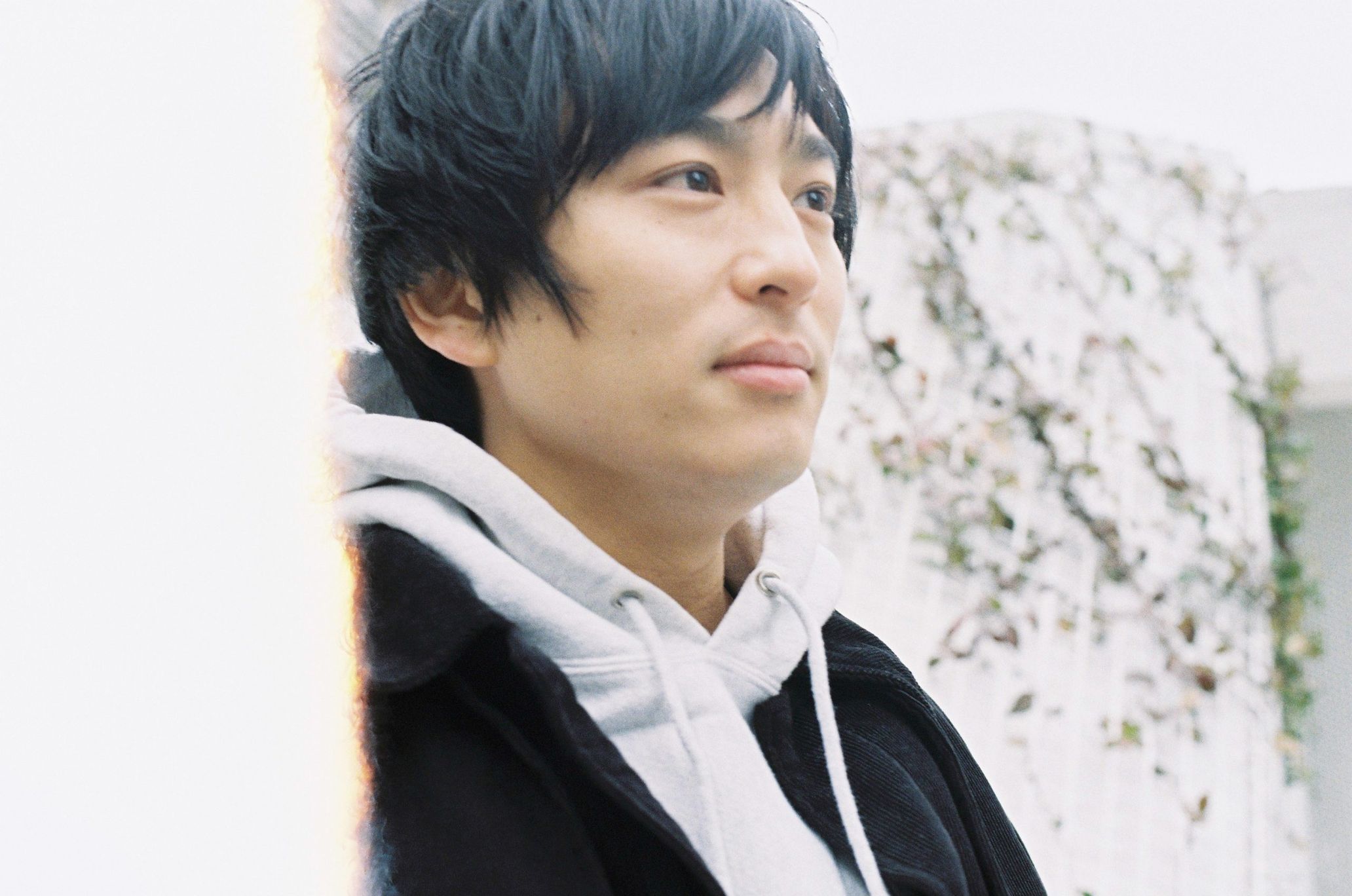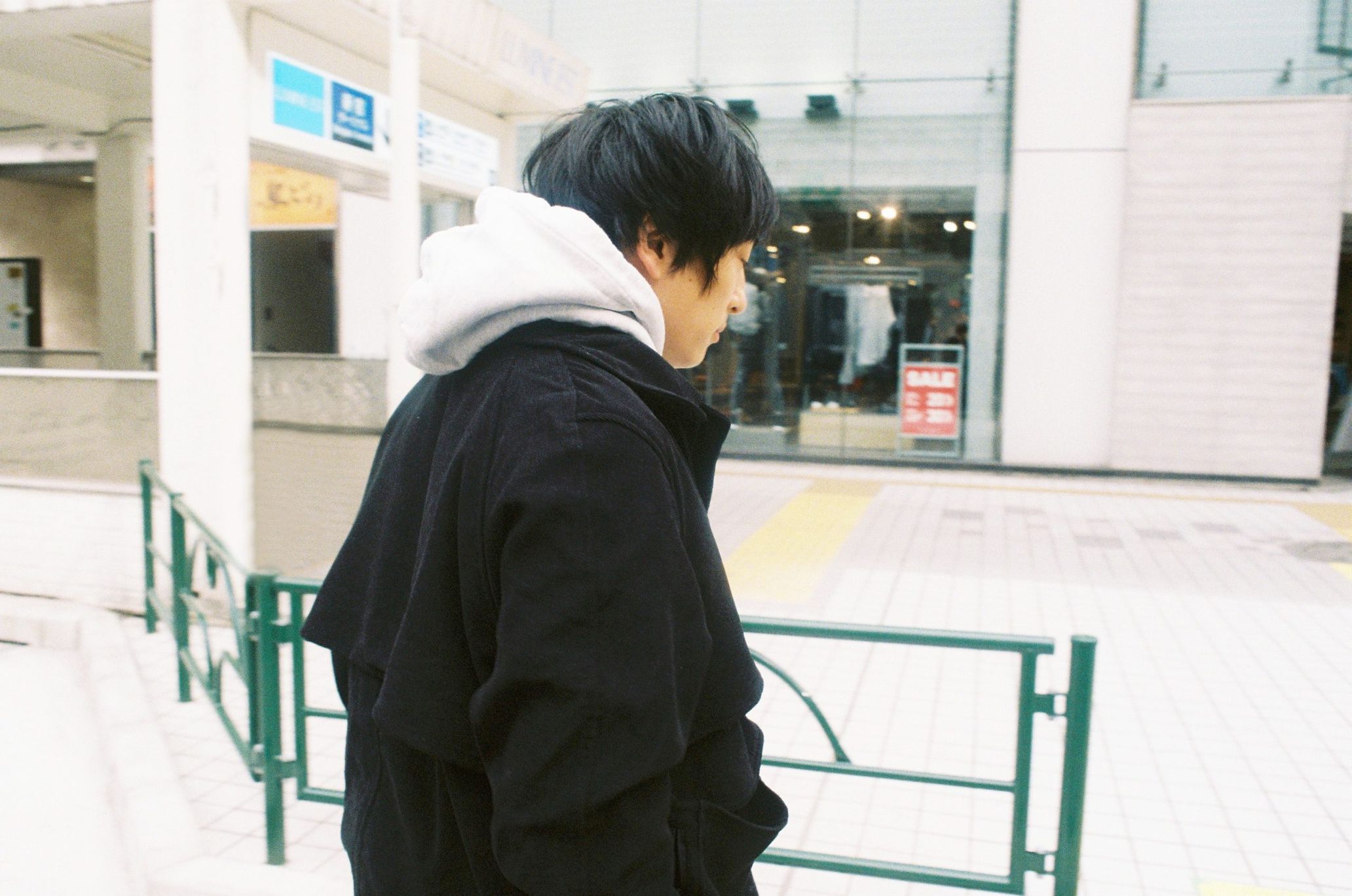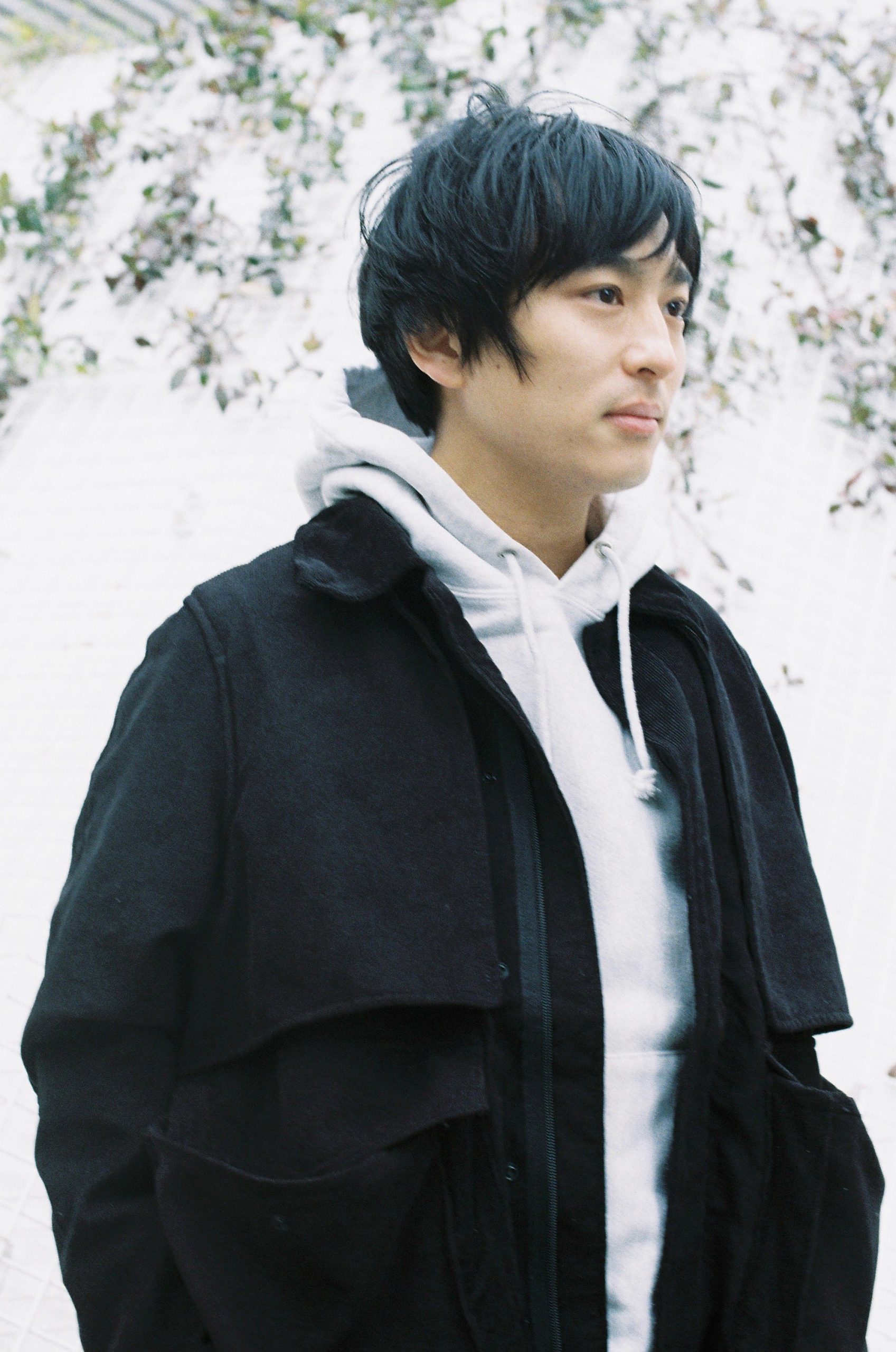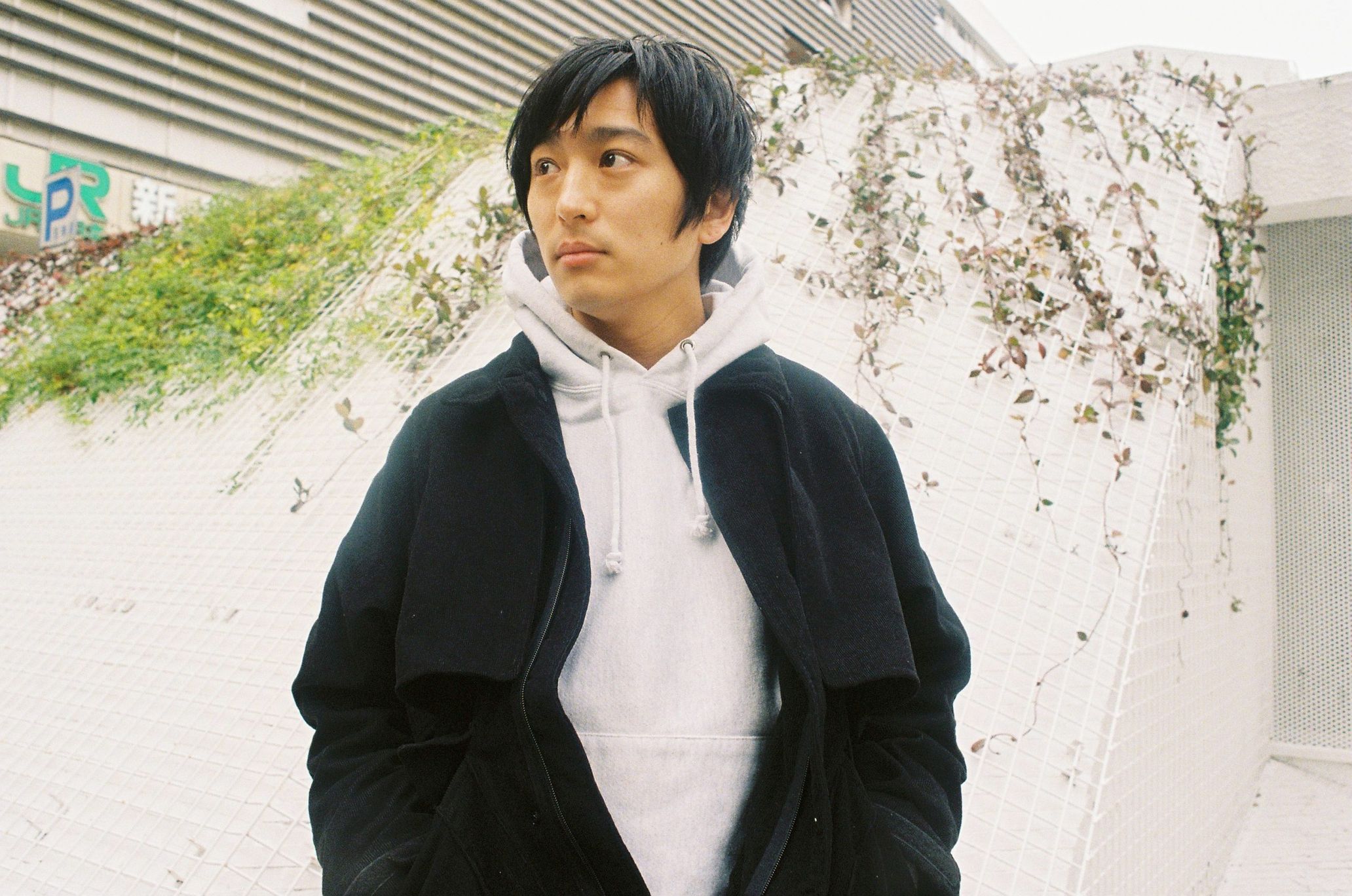In the current, it is both difficult and nonsense to put a person into one job category. We live in a generation where anyone can call themselves an artist/creator, yet, the people who are active in diverse fields, pertaining an unyieldingly spirit or worldview, attain a unique presence.
Yutaro Furutachi started his band career as the lead singer of the band, The SALOVERS, while he was in high school. After the band decided to take an indefinite break, Furutachi started a solo project, and later he formed another band, 2 (‘Two.’) He has been avidly pursuing his career in music; however nowadays, his efforts in other fields including acting and writing are becoming conspicuous as well.
This time, the writer—who still has the flyer of The SALVOVERS’ major debut album, Chin Bung Kan Bung, on the wall of her childhood room, and is known to be Shuden Girl—asked Yutaro Furutachi about his jaded lyrics that are in contrast to the cathartic fast-paced tracks, source of motivation, and sentiments toward acting.
–So far, you’ve experienced being in two bands, done a solo project, and had a leaving band member last year. What are the joyful and tough parts in continuing music?
Furutachi: I’ve been making songs since sixteen and involved with music for about thirteen to fourteen years now; but I’m enjoying now the most, since the time I became independent last year in May. Honestly, the only time I was genuinely interested in playing music was when I was in a cover band from the final year of middle school to sophomore year in high school, which only amounts to less than three years. After that, music became sort of like a duty to me, and I was always feeling obligated and anxiously thinking that “I have to live up to people’s expectations” and “now that I’m a grown man, I need to work harder.”
However, I started realizing around the end of 2019 to beginning of last year that I originally started music for the love of it, and even now, I choose to do it for my delectation and not based on someone’s request—I should enjoy what I do. Take hiking as an example: there’s a difference between strenuously hiking because you want to see the beautiful view from the top and struggling to hike up because you feel coerced to reach the top—I was basically confusing these two. Of course, there are many realistic issues to deal with, but from now on, instead of deeming works as tasks, I’ve decided to think that I’m exerting for what I love. In other words, I can enjoy the struggles of staying up all night finishing the lyrics that I ‘m eager to write or involving in tough shoots of works that I feel honored to be part of as an actor.
–In past interviews, you’ve often stated, “I’m not rock,” but do you still think that way about yourself?
Furutachi: That’s how I’ve always been thinking about myself. If someone, like my relatives ask me, “what kind of music do you do?” I would simply answer, “Rock,” even though that’s not what I actually think. I’m not a person who is devoted to Rock…In fact, the definition of Rock is quite obscure; diverse forms of Rock have been developed in the past but emulating them isn’t Rock. I don’t mean that you have to deny the precedented styles, but I think you need to break them to be Rock. For example, if you truly look up to Kiyoshiro Imawano, you need to do something the completely opposite as what he’s done.
–I guess, following in someone’s footsteps isn’t Rock.
Furutachi: Yet there are handful of musicians who define new interpretations of Rock, and persuasively deliver their works with the word ‘Rock.’ (Kazunobu) Mineta from Ging Nang Boyz and Tomomi Shiiki from My Hair is Bad—who is the same age as me—are those very few people. I think they are incredibly cool, and I respect them from the bottom of my heart. But I can’t do what they do, and I’m not entitled for it.
–What do you want to achieve through music?
Furutachi: During my solo career, I went by the style of no distortion/grainy sounds; I relapsed that style for 2’s second album and made it sound like a US indie-type of music, but I think we are going to alter the style again in the future. The music we are making now is way different from the ones we’ve been putting out and stepping away from the simple genre of Rock.
Therefore, there might be fans walking away from us saying, “2 has changed. They were better before.” There’s always a come-and-go in life, but that doesn’t faze me. I don’t even consider these people cold-hearted, and in fact, they will stay in my mind forever as the precious ones who had supported us in the past. It’s more dreadful to reiterate the same thing over and over again. We might disappoint those who’ve been liking our music so far, and we admire the fans who continue to follow us, but we also want to happily say goodbye to those who part from us. And we will probably garner new fans as we move forward.
–As an actor, you’ve debuted with the movie Hibi Rock: Puke Afro and the Pop Star (premiered in 2014)—How did that come about?
Furutachi: When I was twenty-one years old, I had heard from someone that my favorite comic series, Hibi Rock: Puke Afro and the Pop Star, was going to be turned into a movie by my favorite movie director, Yu Irie, and they were looking for real musicians to play the role of musicians. Up until then, I had never thought about becoming an actor, but I really wanted that part, so I spontaneously enrolled as The SALOVERS. Luckily, the director liked our music video and chose us for the part.
However, we had no idea about acting and went to the set casually as if we were going to a school festival—thinking back, at the time we were a disaster. We would force Motoki Ochiai (another actor in the movie), who was asleep during a break, to wake up, and blatantly yell “let’s hit on cute extras.” But everyone was nice and forgave us. The director instructed us, “I’m not going to tell you what to do, so do as you like,” so, we tried our best as rookies and put out words with the flow. For example, in one of the most significant scenes where I hand the ticket for the gig, I ad-libbed and shouted, “here’s a piece of paper!” It’s definitely an unnecessary and frivolous dialogue. But surprisingly, the director really liked it and I was extremely happy that the scene was used. That’s when I became interested in the acting world.
–I see, being in that movie was a kismet. After all, you were also casted in the movies, Strawberry Song and I’m crazy, premiered in 2019. Do you still enjoy acting?
Furutachi: Later for the movie, Narratage, directed by Isao Yukisada, I performed insouciantly as I did in Hibi Rock: Puke Afro and the Pop Star; and the director was happy with me. But after that movie, I started facing difficulties in acting. When playing roles as a main character in TV drama series and other movies, my nonchalant acting style didn’t apply, and I realized that it’s a world required of a compelling acting skill. The same thing happened as with music—acting was once fun, but it became tough as I started pushing myself to “do better.”
After I shot both movies, I started focusing back to my band for like two years, then last year, I got an offer for a movie I wanted to be in. However, my schedule did not work out and I had to decline, but that rekindled my interest in acting. Last year, I was in TV Tokyo’s drama series, We Dreamed of Her, which was my first acting job in a while. It was exceptionally fun as my close friend, Taiga Nakano, was the protagonist, and [Motoki] Ochiai, who was also in Hibi Rock: Puke Afro and the Pop Star, was there too; so, we were always chatting in the dressing room, able to do unscripted things, and just having a great time. My most profound memory was for the final scene; where each cast had to ad-lib in order, I wept randomly and everyone including the director got excited and said, “it’s exactly like when you shouted ‘it’s a piece of paper! [in Hibi Rock: Puke Afro and the Pop Star]’ This is perfect!” That’s when I noticed that I shouldn’t stress myself to do things right, anymore. I’ve decided to focus on honing what I’m already good at than amending my flaws—I regained joy in acting.
–When you were in The SALOVERS, you often made songs with lyrics containing names of novelists and the word “literature.” How were you influenced by literature?
Furutachi: The first literature that impacted me was J.D. Salinger’s Catcher in the Rye, translated by Haruki Murakami; since then, I got into Haruki Murakami’s books. Not only inspired by Haruki Murakami, The SALOVERS is basically appropriating his style. [laughs]
–Do you normally write your thoughts down?
Furutachi: No, I’ve stopped doing that. It’s maybe because of the radio show, Yutaro Furutachi’s Pashion Fruit (on AuDee), which I started last year. It’s completely unscripted, so I talk freely without any preparation—it naturally gives me the opportunity to summarize my thoughts. By the way, I call the show “a stray radio program of TOKYO FM”, and it’s my current holy grail.
–-You have been writing novels, columns, and blogs, too. Are there specific things that can only be expressed through writing?
Furutachi: I don’t want to sound smug since I’m not that experienced in writing, but I like writing articles, and it can be done more casually than writing lyrics as I don’t need to try to sound cool. For instance, “tako-age (kite flying)” is a great lyricism in an essay, evoking the image of a kite fluttering in the wind as if it’s taking a walk in the air—though, it just doesn’t sound good when it’s used in songs. People who make it sound good in their songs are geniuses, yet it often works better in other written materials.
So far, I’ve only been writing essays that are based on my experiences, but eventually, I would also like to write fictions. I actually started writing one when the state of emergency was declared last year, however, I haven’t been able to finish it.
–Are your lyrics based more on true experiences or fictional stories?
Furutachi: Ideally, I want to write lyrics, based on some remarkable experiences, that are abstract and don’t sound expounding, but that’s difficult to achieve. When I try writing based on some actual events and if the subject is weak, it’s hard to elaborate and the lyrics just turn into a tedious explanation. On the other hand, if I write fictional lyrics, it becomes unconvincing and shallow. These days, there aren’t even any happenings I want to write about, so I’m struggling to write at all.
–Because of the pandemic, we are given less chances to go out and meet people, so I guess, that makes it harder to get inspired.
Furutachi: That’s true. Ironically, I’ve become less busy although I’m doing all sorts of things—Like, there’s less time to just sit back and feel things.
–At 2’s solo live event, Genkai-toppa (meaning, ‘breaking limits,’) you’ve accomplished three shows in one day: you obtain a similar vibe as the brisky songs of 2, going full speed with your activities, and you seem to be enjoying yourself. Do you feel like you’re having fun?
Furutachi: I do. What I want to manifest out loud is that I don’t think I will decline any job offers from now on, unless in particular situations—For live show offers, it could be difficult to make it happen depending on the schedule of the respective member. Instead of just doing whatever is presented to me, I’ve decided to challenge zealously towards pretty much anything.
I’ve been reminded that it doesn’t make sense to live your life for someone else. First, you have to do things for yourself, then hopefully that becomes beneficial for others—ultimately, you need to rev yourself up. There were times where I couldn’t embrace myself and always had negative thoughts, but now, I believe that I should love myself no matter what, and it’s in fact presumptuous to think that I’m living life for someone else. I’m enjoying my life more since I changed the way I think.
Yutaro Furutachi
Born in Tokyo in 1991. Formed the band, The SALOVERS, with his friends in high school. The band won a special recognition award at Senko Riot 2009. In 2015, The band however decided to take an indefinite break, and subsequently Furutachi started a solo project. Later, he founded a new band, 2, in 2017. The band has released three albums: VIRGIN, GO 2 THE NEW WORLD, and Sei To Shi as of January 2021. Furutachi has also been appearing in movies and TV drama series, contributing to magazines and other media as a writer, and hosting a broadcasting show on AuDee, Yutaro Furutachi’s Passion Fruit, with the bassist Natsuhiko Mori. Furutachi also posts his diaries on 2’s official website.
www.2band.tokyo
Photography Mariko Kobayashi
Translation Ai Kaneda








